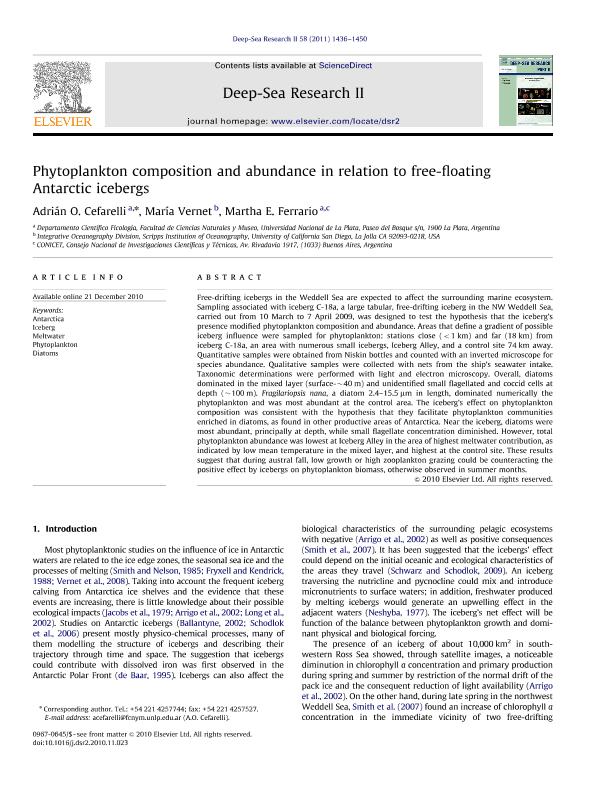Artículo
Phytoplankton composition and abundance in relation to free-floating Antarctic icebergs
Fecha de publicación:
06/2011
Editorial:
Pergamon-Elsevier Science Ltd
Revista:
Deep Sea Research Part II: Topical Studies in Oceanography
ISSN:
0967-0645
Idioma:
Inglés
Tipo de recurso:
Artículo publicado
Clasificación temática:
Resumen
Free-drifting icebergs in the Weddell Sea are expected to affect the surrounding marine ecosystem.Sampling associated with iceberg C-18a, a large tabular, free-drifting iceberg in the NW Weddell Sea,carried out from 10 March to 7 April 2009, was designed to test the hypothesis that the iceberg?spresence modified phytoplankton composition and abundance. Areas that define a gradient of possibleiceberg influence were sampled for phytoplankton: stations close (o1 km) and far (18 km) fromiceberg C-18a, an area with numerous small icebergs, Iceberg Alley, and a control site 74 km away.Quantitative samples were obtained from Niskin bottles and counted with an inverted microscope forspecies abundance. Qualitative samples were collected with nets from the ship?s seawater intake.Taxonomic determinations were performed with light and electron microscopy. Overall, diatomsdominated in the mixed layer (surface-40 m) and unidentified small flagellated and coccid cells atdepth (100 m). Fragilariopsis nana, a diatom 2.4?15.5 mm in length, dominated numerically thephytoplankton and was most abundant at the control area. The iceberg?s effect on phytoplanktoncomposition was consistent with the hypothesis that they facilitate phytoplankton communitiesenriched in diatoms, as found in other productive areas of Antarctica. Near the iceberg, diatoms weremost abundant, principally at depth, while small flagellate concentration diminished. However, totalphytoplankton abundance was lowest at Iceberg Alley in the area of highest meltwater contribution, asindicated by low mean temperature in the mixed layer, and highest at the control site. These resultssuggest that during austral fall, low growth or high zooplankton grazing could be counteracting thepositive effect by icebergs on phytoplankton biomass, otherwise observed in summer months.
Palabras clave:
Antarctica
,
Iceberg
,
Meltwater
,
Phytoplankton
Archivos asociados
Licencia
Identificadores
Colecciones
Articulos(CCT - LA PLATA)
Articulos de CTRO.CIENTIFICO TECNOL.CONICET - LA PLATA
Articulos de CTRO.CIENTIFICO TECNOL.CONICET - LA PLATA
Citación
Cefarelli, Adrián Oscar; Vernet, María; Ferrario, Martha Elba; Phytoplankton composition and abundance in relation to free-floating Antarctic icebergs; Pergamon-Elsevier Science Ltd; Deep Sea Research Part II: Topical Studies in Oceanography; 58; 11-12; 6-2011; 1436-1450
Compartir
Altmétricas




